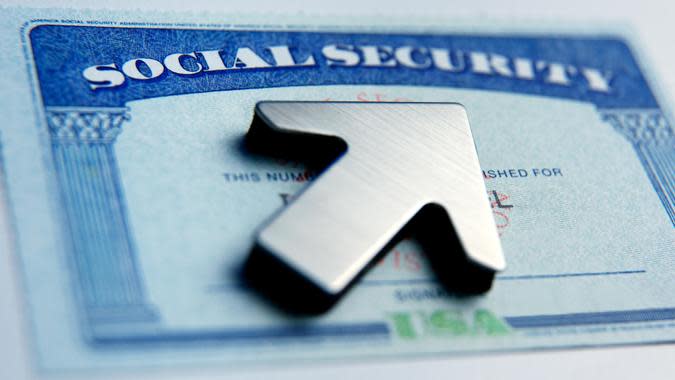What To Look for During Your Year-End Retirement Check-In

During the coronavirus pandemic, you may have had to shift your focus from long-term savings goals to making things work in the short-term. But as 2022 draws to a close and you've had a chance to start transitioning back to your pre-pandemic financial habits, it might be time to get back on track with your retirement savings goals.
Social Security: Women Get $354 Per Month Less Than Men - Here's Why
Find Out: 5 Things You Must Do When Your Savings Reach $50,000
"When saving and planning for your retirement, it's important to acknowledge that there is not a 'one size fits all' solution and to understand if your current plan is right for you," said Ellen Jordan, senior vice president and financial planner at Bryn Mawr Trust Wealth Management. "This is a great time to review your goals and to think about what's really important to you."
Before you check in with yourself or your financial advisor for an end-of-year look at your retirement plan, it's important to know what questions to ask and what aspects of your plan you should be aware of. To help get you started, I spoke with financial experts to get their insights on everything you need to look for during your year-end retirement check-in.

Your Savings Rate
"The only detail that matters is your saving rate," said Ric Edelman, founder of Edelman Financial Engines.
Edelman said that ideally, you are saving 15% of your income.
"Start with your retirement plan at work -- if you're saving 5% and your employer does a 50% match, you're at 7.5% -- already halfway toward your goal."
However, depending on your situation, saving 15% may not be feasible right now -- and that's OK. Even small increases can make a big difference.
One way to grow your savings is to increase your contribution rate by 1% each year until you're saving 15%. If you have access to a 401(k) with an employer match, consider saving at least to at the match level -- otherwise, you're leaving free money on the table.
Take Our Poll: Do You Think You Will Be Able To Retire at Age 65?

If You Had an Income Change That Lends Itself To Increasing Your Savings Rate
If you received a raise in the past year, this is a sign that you should be upping your retirement contribution going into the New Year.
One easy way to start inching up your retirement account contributions is to tie them to salary increases. If you get a 3% raise, for example, you can increase your 401(k) contribution by 1 or 1.5%. It's a win-win -- more money in your budget now, and more retirement savings for the future.

What Your Probability of Success Is Based on Your Current Plan
Because the markets are variable, as 2022 has shown, sticking to a financial plan outlined earlier in the year may no longer be the best plan to meet your goals.
"Your advisor should be able to run an analysis that shows you how much money you will have at retirement and if you should increase your savings today," said Anna Behnam, a financial advisor at Ameriprise Financial Services. "Markets change daily; the goal is to have an 80% or more probability of success of reaching your goals. Ask your advisor, even if you feel you are on track, what is your probability of success. If your score is less than 80%, then it's time to review the plan in place."

Whether or Not Your Monthly Savings Goal Needs To Be Adjusted
During your check-in, Edelman said to ask, "How much money do I need by the time I enter retirement, and am I on track to achieve that amount?" If you're not, then add: "What do I need to do to reach my goal?"
Edelman said that a robust financial plan will include a monthly figure for how much you need to save, as well as where you should be investing it. To stay on track with your retirement plan, you need to stick with this monthly commitment.

If You Have Any 'Orphaned' Accounts
"Check to see if you have orphaned accounts that are floating out there from something like a previous job change," said Will Rogers, an Ameriprise Financial Advisor in Evans, Georgia. "If you find that's the case, you may want to consolidate your retirement accounts into either your current 401(k) or IRA."

If You Have Any Extra Savings You Could Put Towards Retirement
Although many people's finances were negatively affected by the pandemic, some people have actually saved more money than usual over the past few years.
"Some people have noticed they have 'COVID cash' built up -- money that they were previously spending on entertainment, dining out and such that has built up in their checking account as they have cut back on some of those areas of spending," Rogers said. "If you're one of these fortunate individuals, consider increasing your 401(k) or other retirement plan contributions if possible."

Your Mix of Investments
The end of the year is a good time to take another look at where your investments are actually going.
"Examine your current mix of investments and make sure it lines up with your target asset allocation," Rogers said. "If you have too much of one asset and too little of another, you may want to rebalance to make sure your current investment mix lines up with your long-term goals."
"If you have felt relatively calm and comfortable about your finances over the past year, that is a good sign that your asset allocation is appropriate for your risk tolerance," added Chad Parks, founder and CEO of Ubiquity Retirement + Savings. "If you have felt a lot of anxiety and angst about your financial situation, it may mean that you are not invested properly for your risk level. If this is the case, consider having a conversation with your advisor about how you can invest more conservatively."

How Your Portfolio Performed Compared To a Benchmark Index
Look at the performance of your retirement account and how that performance compares to a benchmark index that is invested in a similar way.
For example, you might compare the performance of your stocks to the performance of the S&P 500, and compare your bonds to the Bloomberg Aggregate Bond Index.
Ideally, you will have performed as well as or better than the indices.

What Fees You Are Paying
Review the fees you paid on the securities in your portfolio. If you are paying more than 1% for any fund or security, ask your advisor for advice on lowering or eliminating the fees.

Whether or Not You Could Actually Live Off of Your Projected Retirement Savings
"Whether it's from asking your advisor or using an online tool, having a real assessment of how much income you'll have at retirement is the best way to know if you're on track or not," Rogers said. "If you could live today on your projected retirement income, you're likely on track. If not, then make plans to work longer, save more or ask your advisor what other options you might have."

If You Need To Plan for a Required Minimum Distribution
If you turned or will turn 72 in 2022, remember to take into consideration your required minimum distributions (RMDs) when planning for the new year.
The IRS requires people over 72 to take an RMD each year from traditional IRAs and 401(k)s. The deadline for IRAs is April 1 of the year following the year you turn 72. For 401(k)s, the deadline is April 1 following the later of either the calendar year in which you reach age 72 or the calendar year in which you retire (if your plan allows).

Your Tax Strategy
"Year-end is a good time to review strategies targeted around tax efficiency," said Jay Shah, president of Personal Capital. "You may want to ask your advisor if there are any tax-loss harvesting opportunities in your investment accounts. If you are charitably inclined, it can help to review your investments to see if there are any highly appreciated stocks to donate."

Whether or Not You Would Benefit From a Roth Conversion
Converting a traditional IRA to a Roth IRA could prove beneficial if you earned less this year than in previous years, according to Schwab[x]. Because you pay taxes on your conversion amounts upfront rather than when you withdraw money, you won't owe taxes on future earnings if your withdrawals are qualified.
In the event your future tax rates go up, whether because you've earned more or because tax laws have changed, a Roth conversion could save you money. As an added benefit, Roth IRAs don't require minimum distributions during the original owner's lifetime.

Your Social Security Election Strategy
Rhian Horgan, founder and CEO of Silvur, said this check-in is a good time to carefully assess your Social Security election strategy.
"Benefits increase by 8% every year that you defer collecting Social Security between 62 and 70. This is extremely compelling in the current low-return environment," she said. "For those without a pension or other longevity insurance, Social Security can be one of your most valuable retirement assets."

What Other Forms of Guaranteed Lifetime Income You Have
Horgan said that it's necessary to have some form of guaranteed lifetime income that covers your essential spending. If you haven't thought about what this may be already, now is the time.
"Guaranteed income comes in lots of forms: Social Security, pension and annuity income," she said. "In a world where we are all living longer, ensuring our savings last a lifetime is the ultimate peace of mind and will let you live your best retirement."

Any Further Clarification You Need
If you're meeting with a financial advisor to go over your retirement plan, use this opportunity to ask questions about anything else you may be unsure about.
"Ask questions about anything you don't understand - this could be about the stock market in the current times, your goals or anything else on your mind," said Chris Hogan, author and financial expert."You want a financial advisor with the heart of a teacher, someone who is willing to sit down with you and have your best interest in mind. If that's not what you currently have, consider making a change."
More From GOBankingRates
Gabrielle Olya contributed to the reporting for this article.
This article originally appeared on GOBankingRates.com: What To Look for During Your Year-End Retirement Check-In

 Yahoo Finance
Yahoo Finance 